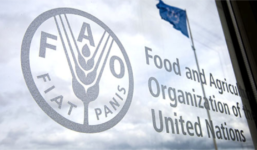FAO trains 100 on aquaculture, homestead gardening in Taraba
FAO trains 100 on aquaculture, homestead gardening in Taraba
The Food and Agriculture Organization of the United Nations (FAO) has trained 100 Taraba farmers on aquaculture and homestead practice to enhance food security, nutrition, and sustainable livelihoods.
Dr Ahmed Muhammed, FAO Fishery and Aquaculture expert who conducted the training, told the News Agency of Nigeria (NAN) on Wednesday in Jalingo that the training, which was more practical than theoretical, was funded by the Government of Norway.
![]()
” data-medium-file=”https://i0.wp.com/vmtnews.ng/wp-content/uploads/2024/08/FAO-trains-100-on-aquaculture-homestead-gardening-in-Taraba.jpg?fit=300%2C230&ssl=1″ data-large-file=”https://i0.wp.com/vmtnews.ng/wp-content/uploads/2024/08/FAO-trains-100-on-aquaculture-homestead-gardening-in-Taraba.jpg?fit=490%2C375&ssl=1″ tabindex=”0″ role=”button” class=”wp-image-37093″ style=”width: 500px;” src=”https://vmtnews.ng/wp-content/uploads/2024/08/FAO-trains-100-on-aquaculture-homestead-gardening-in-Taraba.jpg” alt=”FAO trains 100 on aquaculture, homestead gardening in Taraba” srcset=”https://i0.wp.com/vmtnews.ng/wp-content/uploads/2024/08/FAO-trains-100-on-aquaculture-homestead-gardening-in-Taraba.jpg?w=490&ssl=1 490w, https://i0.wp.com/vmtnews.ng/wp-content/uploads/2024/08/FAO-trains-100-on-aquaculture-homestead-gardening-in-Taraba.jpg?resize=300%2C230&ssl=1 300w” sizes=”(max-width: 500px) 100vw, 500px”>
“This initiative is part of the FAO’s broader efforts under the scaling-up of improved food security, nutrition, and sustainable livelihoods in Borno, Adamawa, Yobe, and Taraba States.
“The project is funded by the Government of Norway and is designed to bolster sustainable livelihoods and enhance food security in Northeast Nigeria, which has 75 per cent women as beneficiaries.
“The training programme has placed significant emphasis on aquaculture, and participants received hands-on instruction in critical aspects, such as fishpond construction, mobile fish tank installation, and water reticulation,” he said.
Muhammed noted that the three-day in-depth sessions covered essential skills such as site selection, pond excavation, shaping techniques, and pond lining and sealing.
“The training also includes practical demonstrations on the installation and maintenance of mobile fish tanks, focusing on setting up water inlet and outlet connections and troubleshooting common issues,” he explained.
According to the FAO expert, a key innovation in the training is the integration of aquaculture with homestead gardening, where participants have learnt how to utilise wastewater from fish farming for the irrigation of a variety of vegetables.
“The water reticulation segment will further equip beneficiaries with the knowledge to design and install effective water supply and drainage systems, ensuring optimal water flow and quality control.
“In addition to technical skills, FAO will support the formation and organization of community groups dedicated to aquaculture projects.
Read Also: Yobe Govt. pledges support for biomedical research training
“Trainees were taken through group management, defining roles and responsibilities, and conflict resolution, ensuring the sustainability and success of these initiatives.
“This training underscores FAO’s ongoing commitment to building resilient communities and advancing sustainable agricultural practices in the region,” he said.
Mrs Easter Solomon, a beneficiary, told NAN that she was so excited to be part of the training, describing it as a life changing opportunity.
Solomon, who is a group leader of one of the three groups in the training, pledged their commitment to ensuring the achievements of the objective of the project and its sustainability.
Miss Neiwana Karimu, another beneficiary, thanked FAO for bringing job opportunities to their doorstep for the good of everyone.
“I want to commend FAO for this wonderful opportunity. This project will benefit all the people of the state because the fish and variety of vegetables that we will be producing here will be a nutrition hub for all,” she said.
Good journalism costs a lot of money. Yet only good journalism can ensure the possibility of a good society, an accountable democracy, and a transparent government.
For continued free access to the best investigative journalism in the country, we ask you to consider making a modest support to this noble endeavour.
By contributing to Voice Media Trust, you are helping to sustain a journalism of relevance and ensuring it remains free and available to all.
Donate into:
Dollar Account:
- A/C NO: 3003093745
A/C NAME: VOICE MEDIA TRUST LTD
BANK: UNITED BANK FOR AFRICA
Naira Account:
- A/C NO: 1023717841
A/C NAME: VOICE MEDIA TRUST LTD
BANK: UNITED BANK FOR AFRICA
Related




